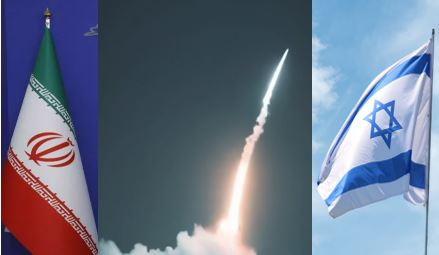Iran’s Potential Retaliation Threat: The 1 Weeklong Waiting Game Leaving Israel on Edge
Iran’s Potential retaliation threat and the way Iran has left the whole of Middle east, especially Israel & their western allies in guess-mode, has created a scary silence before the storm. The region is on the edge & bracing for a larger conflict.
The backdoor channel negotiations with Iran, over-night diplomacy by USA & espionage by both Iran & Israel are on intense stage to avoid the retaliation threat. Israel is on high alert defensively & offensively as per statements made by IDF (Israel Defense Force). Iran has been issuing NOTAM to airlines almost every day & instructed to avoid Iran’s air space due to military exercises.

The recent killing of Hamas Political Bureau Chief Ismail Haniyeh in Tehran (Iran) in a covert operation allegedly by Israel, has created this rage and a face-saving compulsion for the Iranian Government. If the assassination was not enough, Israel also killed Hezbollah Commander Fuad Shukr during air strike in Syria the next day and has continued devastating bombing in Gaza strip amid decreasing peace-talks with Palestine.
The fragile atmosphere has pushed Iran to a corner and Iran has reportedly & repeatedly stated to cause disproportionate damage to Israel. Iran has vowed to punish Israel & has been preparing militarily to attack Israel.
“A severe punishment at the appropriate time, place and manner”– Islamic Revolutionary Guard Corps, Iran
As per reports, Israel has notified their ally USA that they anticipate an imminent attack any time, any day now from Iran. USA intelligence is also expecting a major operation by Iran and has boosted their military strength in middle east by sending aircraft carrier, land attack submarines, fighter jets in a bid to support Israel militarily. USA has also extended 3.5 billion USD financial aid to Israel to procure US made weapons on emergency.


Despite the strong rhetoric, Iran has not yet fired a retaliatory attack. Several factors contribute to this delay:
Probable Diplomatic Fallout
Iran is mindful of the wide diplomatic implications if it proceeds to inflict a direct attack on Israel. This could harm potential ceasefire talks between Hamas and Israel, as well as Iran’s own diplomatic relations with other countries.
In such a scenario, this will only help Israel to consolidate its stand in Palestine for many more years and possibilities of a solution to Israel-Palestine dispute will be endangered.
Additionally, Iran may lose relationships with friendly countries and OIC nations (Organizations of Islamic Cooperation), who have reportedly not extended their outright support for a direct attack on Israel.
Backdoor Channel Maneuvers
Iran is carefully undertaking maneuvers on backdoor channels and engaging in acceptable diplomatic possibilities to propagate Iranian concerns.
While doing so, Iran is understanding their position in obtaining diplomatic support, military support, Intelligence support, which can be received from friendly nations.
At the same time Iran is weighing the costs and benefits of various response options. A hasty attack like April 2024, could escalate this time into a full-blown conflict, which might not be in Iran’s best interest. Subsequent to their no-so-effective April attack, Iran has lost their President in a mysterious chopper crash, Hamas political bureau Haniyeh has been assassinated, Hezbollah commander Fuad Shukr has been killed in addition to many lives lost in Gaza due to Israeli Military Actions. So, Iran is probably gauging all the backdoor diplomacy, gathering support and planning a response that will be looked at moderately, yet effective.
Internal Security & Politics
Iran is also focusing on addressing the security lapses that led to Haniyeh’s assassination. Ensuring such breaches do not recur is a priority before any external action is taken.
This is extremely important for Iran to protect their political leaders, scientists and military sites, in case of an all-out war with Israel.
It is obvious to expect a counterattack from Israel, which may involve killing of more prominent figures in Iran, Hamas, Hezbollah and important commanders in the Iran Supported Proxies.
At the same time, there are few news from Iran involving formation of new cabinet of ministers under the new president and a resignation from the vice president Javad Zarif, who was a prominent negotiator if 2015 nuclear deal with USA.
Hence, Iran may be working on consolidating their new government and sealing the security gaps which can be exploited by Mossad, Israel.
USA Military Presence in Middle East
Under the circumstances, USA has re-affirmed their iron-clad support to Israel and has been working to boost their military assets in middle east. USA Forces are expected to engage in defensive missions, if Iran unleashes a missile attack on Israel.
As per reports, USA has dispatched USS Abraham Lincoln Aircraft Carrier Group to be deployed in middle east on priority. The carrier is known to have F-35 & F-18 Fighter jets on board. It is also reported that US Air force has sent F-22 raptors to regions near to Israel. An US Navy guided missile submarine has also been ordered to move towards middle east.

Amid this military show of strength and in solidarity to Israel, USA is also working diplomatically to make Iran stand down. Biden administration has also tried to put pressure on Iran through European nations to rule out the escalation.

The uncertainty surrounding Iran’s response has left the Middle East on edge. Countries in the region are closely monitoring the situation, preparing for potential fallout. The international community is also watching, concerned about the geo-political implications.
While Iran’s next move remains uncertain, the strategic delay in its response highlights the complexities of the geopolitical landscape in the Middle East. As the region holds its breath, the world watches closely, aware that any misstep could have far-reaching consequences.

One thought on “Iran’s Potential Retaliation Threat: The 1 Weeklong Waiting Game Leaving Israel on Edge”